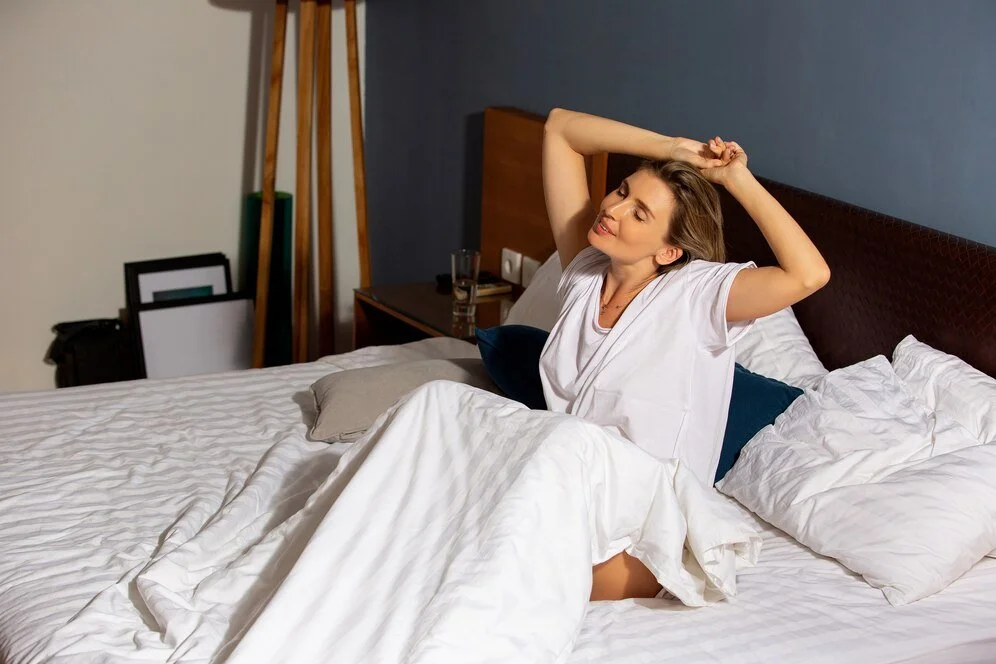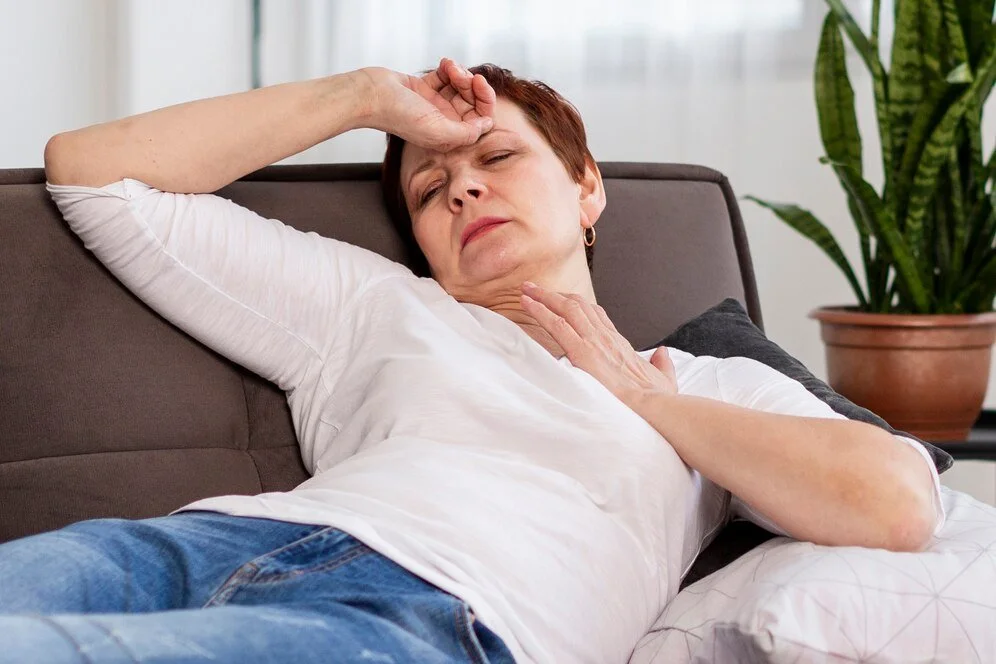How To Sleep in the Heat During Perimenopause
Last Updated 20 October 2024
Perimenopause is a transitional phase that can bring about various physical and emotional changes, including sleep disturbances. Many women experience increased body temperature, hot flashes, and night sweats during this time, making it challenging to achieve restful sleep, especially in warmer weather. This article will explore effective strategies for sleeping comfortably during the heat of perimenopause.
Understanding the Impact of Hormones
Hormonal fluctuations during perimenopause significantly affect sleep patterns.
Oestrogen and Progesterone: As oestrogen and progesterone levels decline, women may experience symptoms such as hot flashes and night sweats. These symptoms can disrupt sleep by causing sudden awakenings and discomfort.
Temperature Regulation: Hormones play a crucial role in regulating body temperature. The decrease in oestrogen can impair the body's ability to cool down during the night, leading to increased discomfort when sleeping in warm conditions.
Sleep Architecture Changes: Research indicates that women in perimenopause may experience alterations in sleep architecture, including reduced slow-wave sleep (SWS) and increased wakefulness after sleep onset (WASO). These changes can exacerbate feelings of fatigue and irritability.
Understanding these hormonal impacts is essential for developing effective strategies to improve sleep quality during this transitional phase.
Creating a Comfortable Sleep Environment
A conducive sleep environment can significantly enhance comfort during hot nights.
Keep It Cool: Aim to maintain a bedroom temperature between 16°C to 19°C (60°F to 67°F). Use fans or air conditioning where possible to regulate the temperature effectively. If air conditioning is not available, consider placing a bowl of ice in front of a fan to create a cooling breeze.
Use Breathable Bedding: Opt for lightweight, breathable bedding made from natural fibres such as cotton or linen. These materials allow for better airflow and moisture-wicking, helping to keep you cool throughout the night.
Choose Appropriate Sleepwear: Wear loose-fitting, lightweight pyjamas made from breathable fabrics. Avoid synthetic materials that can trap heat and moisture against the skin.
Block Out Light: Use blackout curtains or blinds to keep your bedroom dark during the day. This will help maintain a cooler environment by preventing heat from entering your room.
Implementing Relaxation Techniques
Incorporating relaxation techniques into your bedtime routine can help ease the transition into sleep.
Cool Showers or Baths: Taking a cool shower or bath before bed can lower your body temperature and promote relaxation. Avoid extremely cold water, as it may cause discomfort; lukewarm water is often ideal.
Mindfulness and Breathing Exercises: Practising mindfulness meditation or deep breathing exercises can help calm the mind and prepare your body for sleep. Focus on slow, deep breaths to reduce anxiety and promote relaxation.
Yoga or Stretching: Gentle yoga or stretching before bed can help release tension in the body and promote relaxation. Focus on poses that encourage deep breathing and relaxation of the muscles.
Limit Screen Time: Reduce exposure to screens at least an hour before bedtime. The blue light emitted by devices can interfere with melatonin production, making it harder to fall asleep.
Dietary Considerations for Better Sleep
What you consume throughout the day can impact your ability to sleep well at night.
Stay Hydrated: Drink plenty of water throughout the day but limit fluid intake close to bedtime to reduce nocturia (the need to wake up at night to urinate). Staying hydrated helps regulate body temperature but avoid excessive fluids before bed.
Avoid Stimulants: Limit caffeine intake in the afternoon and evening, as it can interfere with your ability to fall asleep. Similarly, avoid nicotine close to bedtime, as it is also a stimulant that can disrupt sleep patterns.
Watch Your Evening Meals: Avoid heavy meals close to bedtime. Opt for lighter snacks if you feel hungry; foods rich in magnesium (such as nuts or leafy greens) may promote relaxation and improve sleep quality.
Limit Alcohol Consumption: While alcohol may initially make you feel drowsy, it can disrupt sleep later in the night. Reducing alcohol intake can lead to improved sleep quality overall.
Seeking Professional Guidance
If sleep disturbances persist despite implementing these strategies, seeking professional guidance may be beneficial.
Consult a Healthcare Professional: A healthcare provider can assess your symptoms and recommend appropriate treatments or lifestyle changes tailored to your needs. Hormone replacement therapy (HRT) may be an option for some women experiencing severe symptoms related to perimenopause.
Cognitive Behavioural Therapy (CBT): CBT for insomnia is an effective treatment that helps individuals change negative thought patterns associated with sleep. This approach can be particularly beneficial for those struggling with anxiety related to sleep disturbances.
Explore Alternative Therapies: Some women find relief through alternative therapies such as acupuncture or herbal supplements like black cohosh or valerian root. However, always consult with a healthcare provider before starting any new supplements or therapies.
Conclusion: Embracing Change for Better Sleep
Navigating the challenges of sleeping in heat during perimenopause requires understanding hormonal changes and implementing effective strategies tailored to individual needs. By creating a comfortable sleep environment, incorporating relaxation techniques, adjusting dietary habits, and seeking professional guidance when necessary, women can significantly improve their sleep quality during this transitional phase.
Ultimately, embracing these changes not only enhances sleep but also contributes positively to overall wellbeing during perimenopause. A proactive approach empowers women to take control of their health journey while adapting to the inevitable changes that come with this life stage.
Sources
NCBI: Sleep and Sleep Disorders in Menopausal Transition
Medical Prime: Sleep Disturbance During Perimenopause
WebMD: Menopause and Sleep Problems




